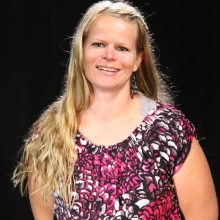Early Childhood Mental Health Conference Addresses Effects of Childhood Trauma
September 13, 2015

Speak to a woman in a substance use treatment program, or in the public mental health system, and you will most likely find she had experienced trauma as a child. This is just one example of the results of many studies showing that childhood trauma, such as physical abuse and neglect has lasting, often devastating effects throughout the lifespan of the survivor.
On September 17th and 18th, TRI's Amber Ryerson was among nationally and internationally recognized speakers at the 6th Annual We Can't Wait Conference in San Diego. This conference was filled with presentations on evidence-based practices for prevention, screening, assessment, and treatment of children and families with trauma.
We Can’t Wait VI - Trauma Informed Care: A Lifelong Perspective for Living Well
The target audience for this annual conference includes all people involved in providing assessment, treatment, education, support, and advocacy for children and families, such as psychiatrists, pediatricians, marriage and family therapists, social workers, psychologists, mental health workers, counselors, nurses, teachers and educators, speech therapists, occupational and physical therapists, child welfare workers, mental health administrators, and many more.
Amber led two presentations:
Transition Training:
Participants explored the immediate and long-term effects of loss and trauma children experience through discussing real-life stories. Based on current policies, they developed strategies to support interventions for this vulnerable population.
Co-Presenters: Deb Stolz and Terra Jones
Preschool Bullying:
Co-Presenter: Deb Stolz
TRI’s Amber Ryerson reflects on her time at the conference:
"I had the privilege of facilitating two sessions at the 6th Annual “We Can’t Wait - Early Childhood Mental Health Conference" in San Diego, California, in collaboration with Deb Stolz, Director of Foster Adoption Parent Organization. The conference drew 300 participants each day, which included Early Childhood Professionals, Therapists, Doctors, Nurses, and Mental Health Consultants.
I was very moved by Bruce Perry’s powerful presentation on
how trauma and resiliency affect the brain. Dr. Perry is an internationally recognized authority on children in crisis, and the author of over 500 journal articles, book chapters, and scientific proceedings.
The first of my sessions focused on transitions of infants in the current foster care system and the traumatic experiences children experience. Co-presenter Terra Jones, a parent of an adopted child, shared her story of the trauma her daughter experienced during the adoption process and the impact it had on her family.
My second session focused on bullying in the preschool years and how children who experience trauma early in life are at a greater risk of being bullied or bully others. The session included interactive activities focusing on how to support families and Early Childhood Professionals.
I am excited and honored that I have been asked to return next year to present at multiple sessions and participate in the planning of next year’s conference."
Here is the slide presentation, Recognizing and Addressing Bullying as Early as Preschool.
For more information about the conference, click here.
Recent News Items
Three More Years for Campus Against Sexual Assault Program Nov 9, 2016
Study of Qigong Massage on Elementary School-Aged Children with Autism Shows Promising Results Sep 8, 2016
Doris Cancel-Tirado Named Abby's House Woman of the Year Jun 4, 2016
Western's Sexual Assault Prevention Featured in the Statesman Journal Mar 16, 2016
Life Experiences Inspire Crucial Research into Health Disparities for Latino Children Jan 29, 2016


